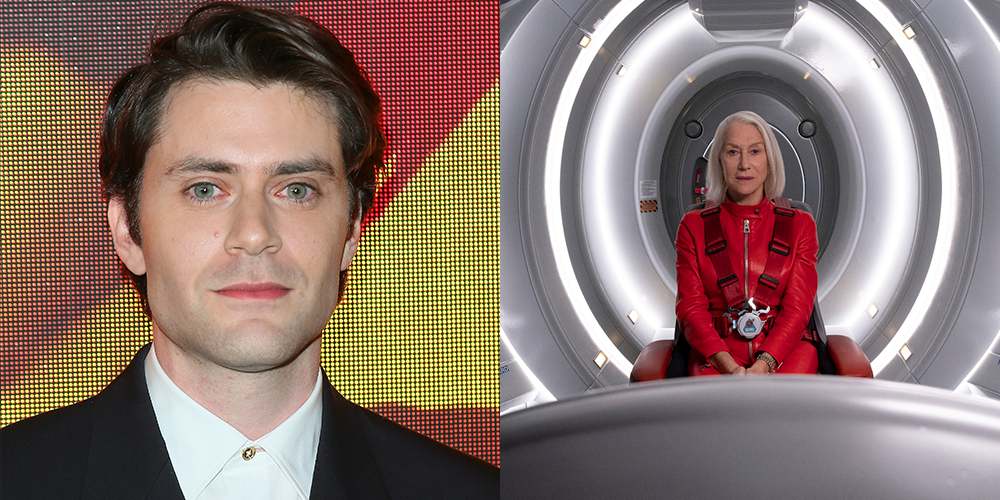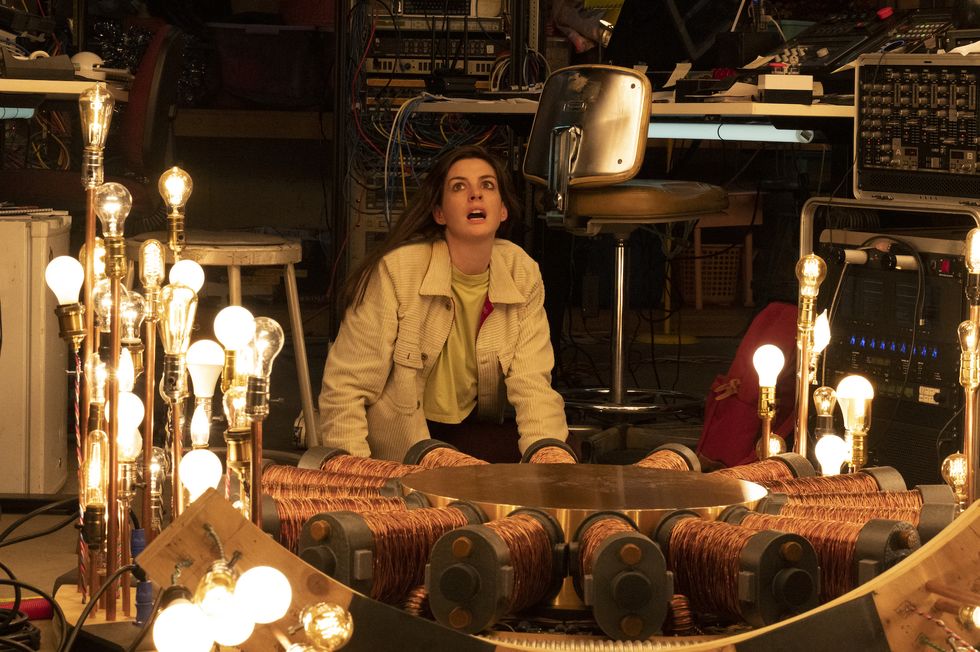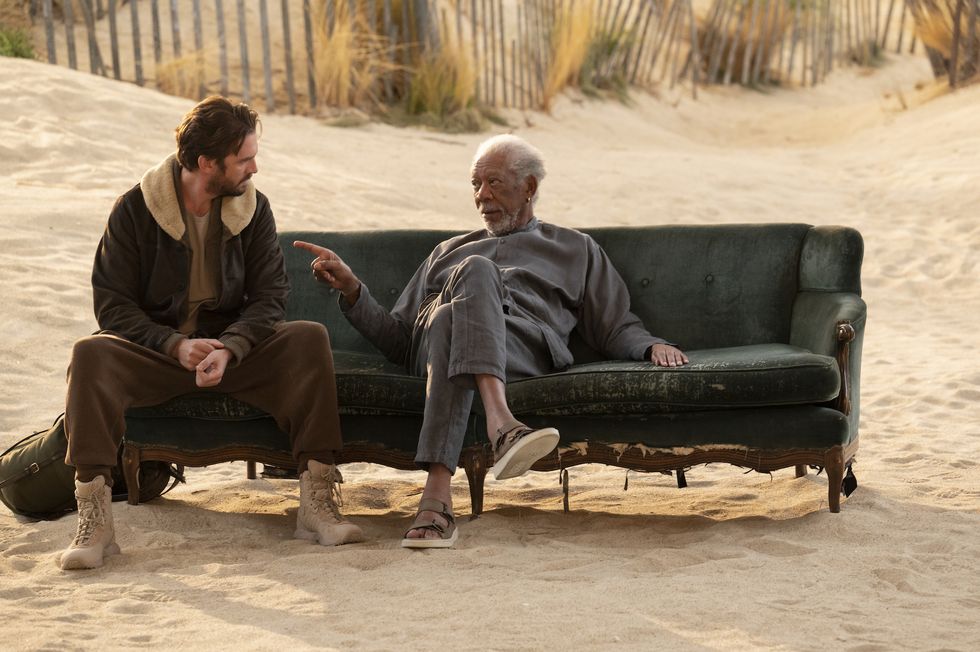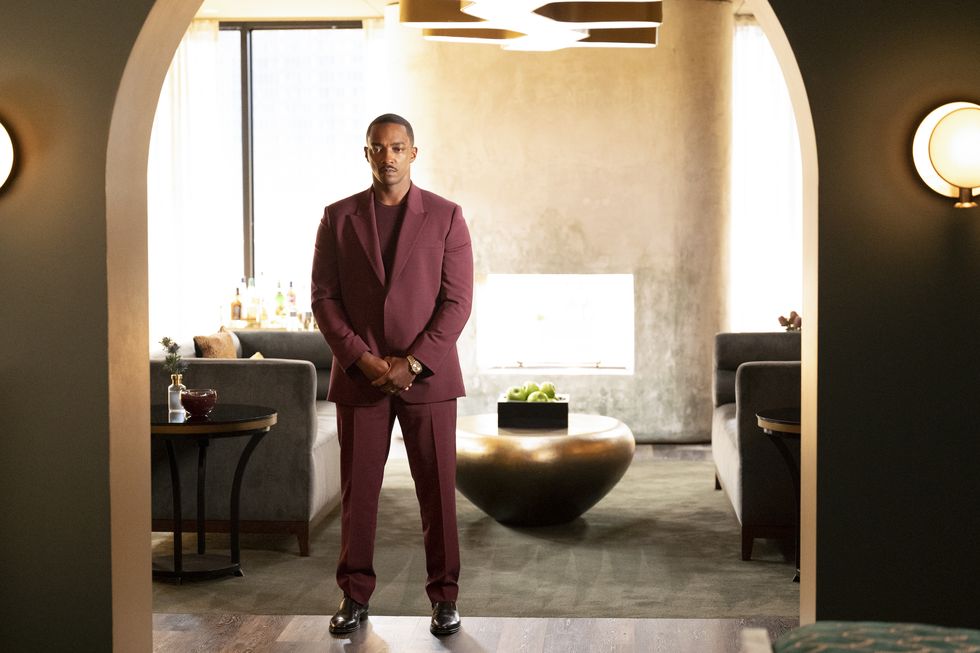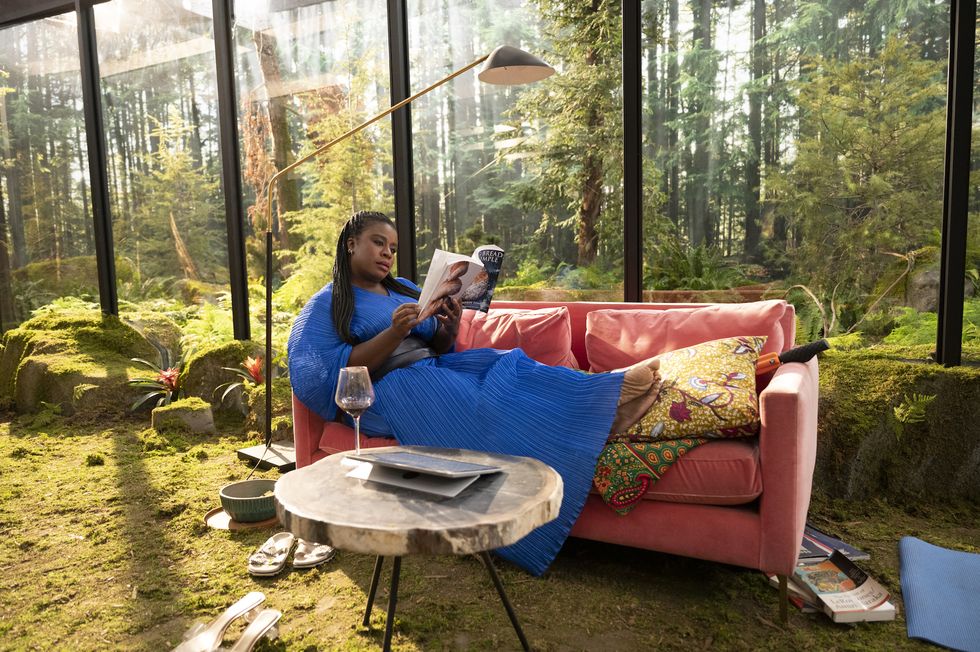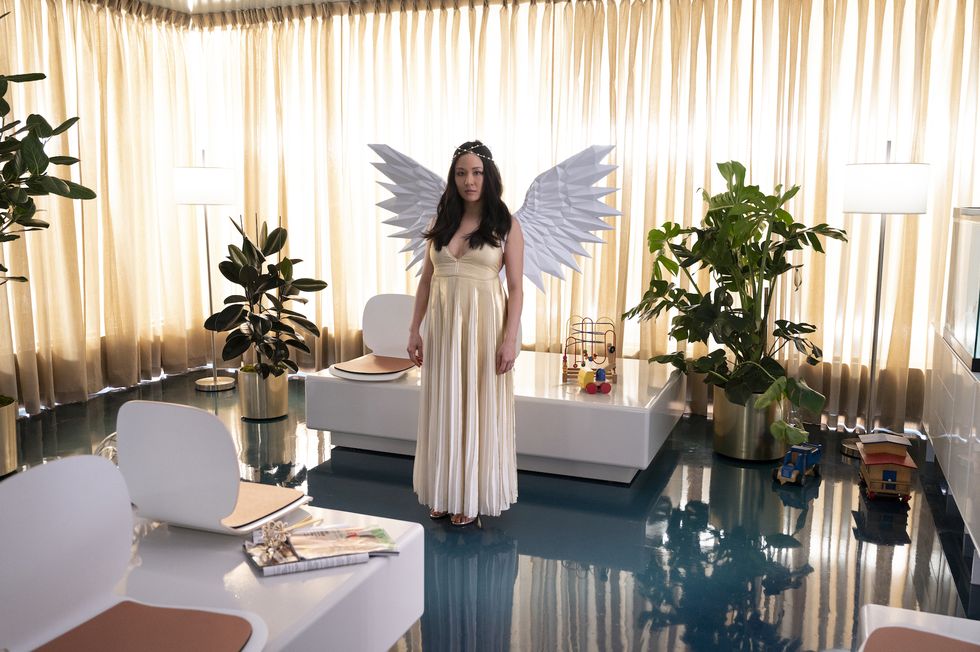Like its name suggests, Solos was an admittedly selfish endeavour for creator and showrunner David Weil.
“It’s a strange thing to have to sit home and not be able to have that wonderful collaboration, not be able to perform or produce or write or create,” says Weil over Zoom from Los Angeles, his base for the last decade after leaving the East Coast. “Solos became the answer for me.”
Solos is a seven-part Amazon Studios anthology series created, written and directed by Weil, featuring Sam Taylor-Johnson, Zach Braff and Tiffany Johnson as episodic directors and an impressive cast that includes Anthony Mackie, Helen Mirren, Anne Hathaway, Constance Wu, Uzo Aduba, Nicole Beharie, Morgan Freeman and Dan Stevens. Each separate in their story, the episodes’ intent is to create a universality in loneliness. One of the show's lines— “In feeling alone, we are somehow all together”—really hits the nail on the head when it comes to the past year.
The pandemic separated many of us from each other, leaving a gaping hole that we all sought to fill in some way. Writing Solos brought Weil closer to his loved ones again, who were ingrained into everything he wrote. And while monologue-fuelled, theatre-like productions don’t often do well for a TV audience, Weil is nothing if not a risk-taker. His breakout show, Hunters, mixed fact with fiction — to the horror of some and the applause of others — to follow a New York City band of Nazi-hunters seeking revenge on the traumas left behind after the Holocaust.
“Donald Glover tweeted something the other day about there being a lot of rote and boring television out there because creators are afraid to take risks for fear of being cancelled [by a network],” Weil says. “I loved his sentiment. Solos, Hunters, everything I do, I want it to feel risky and different and bold.”
As Solos premieres, Apple TV+’s Invasion shouldn’t be too far behind for Weil. The closely guarded character-driven alien story was co-created by Weil and Simon Kinberg, and stars Sam Neill and Shamier Anderson. Weil is also ramping up production on Amazon’s second season of Hunters, the show that catapulted Weil out of Hollywood script-doctoring anonymity to acclaim and controversy alike.
We spoke to him about all that and more, including farts, secret handshakes and the catharsis of an actual hug.
Esquire: How and when did you come up with Solos?
David Weil: I’ve always wanted to create a series that transported me back to how I first fell in love with stories. And I first fell in love with stories with the finest of storytellers — my grandmother, my mom, my brother. In my family, it was always one person in one room telling a singular story, but it would completely transport me to these beautiful worlds or take me on this roller coaster ride of emotions. Look, I don’t know that a monologue series is always the first thing a network is looking to program, but I certainly think that during the past year we’ve all lived through in the pandemic, with production being pushed and it being much more challenging to produce larger content, it found its place. I also think that we, as a world, were in a place emotionally where we were reflecting, where we were struggling, we felt isolated and alone. I thought, what a great moment to put together a series that was about connection, that allowed an audience member to feel like they were in a room with their favourite actors, listening, transfixed by a singular story. I wrote this in May 2020, though it’s an idea I’ve had for years, it was quite an accelerated process getting it to air during the pandemic.
Ironic, since the entire industry had decelerated.
Absolutely. I had a number of shows and productions that were pushed. I was craving being back on set, back with a great community of artists and able to tell stories.
Solos does seem like the perfect production for a pandemic.
I think the wonderful thing is that is so timely, but I hope also timeless. It’s certainly not a pandemic show, though. We shot it during the pandemic and had one actor in each episode, and that was an incredibly safe way to produce television. So, it speaks to the moment, but it’s also about a more universal series of stories and emotions.
Right. The theme is human connectedness, but why, exactly, was that something you wanted to explore via a show?
It’s selfish. [Laughs]. Everything I write satisfies a desire; a question, dream, a nightmare, or fear that I have. I’ve been living in Los Angeles now for 10 years, my entire family is on the East Coast, and during the pandemic I didn’t get to see them for a year and a half. I had to push my wedding like three times. We finally just eloped. So, like in Peg, with Helen Mirren, there are so many elements of my mum. With Tom, [in Mackie] there are so many elements of my dad and my brother. I think this story was almost a love letter to them. It was a way to reconnect with them in an incredibly deep way when I couldn’t see them, hug them, be with them, share memories with them. I do believe that Solos will be a time capsule of how we’re living now.
Did you write each episode with a specific actor in mind?
I feel like I write everything with Helen Mirren or Anthony Mackie in mind. [Laughs]. This truly is the dream cast. But no, I always write with the character in mind; I know who that character is. I write with a feeling in mind, or a look or an emotion, these little mosaic tiles that I’ve observed or discovered in life, then I begin to piece together who the character is. And then once we cast the incredible actor, like Anne Hathaway, for example, part of the thrill with Annie was diving into her three characters and really defining them. She is so right there with you in the ring, wanting to help create and develop and perfect. She had a great deal of input on who these characters were and really helped to define them.
While all but the last two episodes have one character in them, the last one, Stuart, has Morgan Freeman and Dan Stevens hugging. Is that how the story was always written, or was it because Covid restrictions were lifting?
It was a journey toward that point. These are episodes about solitude and loneliness, and I wanted the finale to feel like a resolution and an achievement of sorts. That wonderful hug between Morgan Freeman and Dan Stevens’ characters, to me, it’s the catharsis. That’s what I was after with the show and part of the reason I wrote it — that hug symbolised the hug that I wish I could give my parents and siblings and nieces and nephews, one of whom I haven’t even met yet because she was born in March 2020. That desire for true, visceral, physical connection is crystallised in that final moment between Stuart and Otto.
At times, Solos has a little bit of a Black Mirror feel to it. That technology, futuristic theme. Was that show an inspiration for you at all?
I love that show so much, and I am a huge science fiction geek. 2001: A Space Odyssey is my favourite film of all time. There’s a spirit of shows like that—Twilight Zone, Alfred Hitchcock Presents, and Black Mirror is a genius show for sure, but I think I was more inspired by the genre then in particular Black Mirror. The beauty of Solos is that it’s really about the character, the emotion versus the concept. The concept is just the way in to tell a very humanistic, intimate story. And I think Black Mirror is an exploration, at times, of the concept itself.
There are a few motifs that kept coming up in Solos: secret handshakes and farts and mothers. What’s up with that?
[Laughs] I think they’re just true to life. You write what you know, right? All those things are there in my relationship with my wife and in our shared lives, too. Our mums are so important to us, and my grandmother was important to me.
So, you’re saying your wife—or your mother—has lethal farts?
There are certain things I can’t say in print, or I’ll be in the doghouse, but handshakes are definitely a part of our life for sure. [Laughs]. And yeah, look, we’re human beings. I love characters who are just so real, who are not manicured. I love the blemishes of humanity, and I think that this show certainly sheds a light on that.
I mean, Helen Mirren talking about her lethal farts might be one of the best moments ever captured on screen. But let’s pivot here a bit: you’re about to start shooting season two of Hunters. What can you tell us about the upcoming season? Sans spoilers, of course.
I think everything in Hunters is a spoiler. I’d say, always expect the unexpected. There will be so many wonderful twists and turns, character reveals, people who you thought were heroes may turn out to be villains, people who you thought were villains are most likely going to stay villains. One of the exciting things about Hunters for me this season is the depth and dimension at which we explore our characters. There are so many unexpected revelations within our characters that I think an audience will respond to. Also, we’ll be globetrotting a lot. We’re all over — in Europe and South America, back in the States — so it’s going to be a fly-by-the-seat of your pants, epic adventure that at its core seeks to do what I set out to do with the piece: it has to be a love letter to my grandmother and honour the victims and survivors of the Holocaust.
Speaking of that, what’s your take on the controversy over the fictionalisation of some of the atrocities in season one?
I feel like I said it best in my statement. My chief responsibility is to honour the victims and survivors of the Holocaust, and my barometer is always, ‘Would my grandmother be proud of the show?’ And I know that she would. I felt at times that fictionalisation was important in that I did not want to misrepresent a specific individual’s life or a specific event or use a specific event by way of realising the show. So, for example, the tattoos, the numbers on the survivors or victims’ arms, those were ahistorical — the highest known number ever given to a victim or survivor of the war was 202499. I chose that every number that we see depicted on the show should be higher than that because I never wanted to misrepresent a person’s life who actually had a specific number. I didn’t want to get their story wrong, you know? That was one of many choices I made truly to service their memory or their lives and yet still communicate the atrocities in the horror of the war. I needed to show how sadistic the Nazis could be, but I didn’t always feel comfortable using a specific example from a specific person’s life. But they are all in the spirit of the kinds of sadism that the Nazis perpetrated against their victims.
Did that controversy change the way that you approached the season two at all?
That’s such a great question, but I will reserve the right to speak after the season has aired. We’re still writing mode and we’re set to start shooting soon. I will say, though, that I love to listen to how people interact with the show, and I think that’s always incredibly important to me. I feel that in the way I realised season one of Hunters, I’m incredibly proud of it; I would not have changed anything, and I head into season two with the same code and spirit. It’s important to me how people are experiencing the show and I can continue to honour the victims and survivors of the Holocaust.
And after Solos, Invasion is coming out next. Not asking for spoilers, again, but what can you tell us about that series?
It’s a beautiful show and I feel so lucky to have created it with my friend and the brilliant Simon Kinberg. It’s been a real labor of love and the pandemic shut us down for a time. But we’ve recently finished production. It’s an incredibly ambitious show that we shot in multiple countries and on multiple continents. It is quite epic — it’s going to be a real global event series, and I’m incredibly excited for the world to see it, but I will say that creating it and writing some of the episodes was such a thrill and a joy. Apple really pushed for us to dream big and wanted to create a reality about the piece, which is why we shot in Japan and in the States and in London and other places around the world. I think it will be a real spectacle and it turns the alien invasion genre on its head, and I’m quite excited about that reinvention.
You’re pretty heavily ensconced in sci-fi storytelling now, but you started out writing dramas and family dramas. As you say, you’re a sci-fi nerd, so is this ultimately where you wanted to end up?
Any science fiction I do, at its core, there is a character drama, a family drama, a relationship drama. To me, that’s the best science fiction. I think Arrival is a film that I admire so much and speaks to what I mean about sci-fi being drama at its heart. Eric Heisserer’s script is so beautiful in part because it’s really a story about loss and grief — a mother who lost her child, set against this alien invasion as a backdrop. I love science fiction with heart and soul, not necessarily some of the space operas out there or the more cerebral science fiction. For me, the ambition was always to marry genres. At is core, any genre that I play in, I love the central relationship or family drama. So, too, Hunters, right? Hunters certainly is a graphic novel come to life in certain ways or a historical drama realised, but at its core, it’s about this dysfunctional family of the hunters and within that core, it’s really about the story of a grandchild and his grandmother and a quest for justice for her. Everything I do has that great drama core, but I like to play in different genres, for sure.
This interview has been condensed and edited for clarity.
Like this article? Sign up to our newsletter to get more articles like this delivered straight to your inbox
Need some positivity right now? Subscribe to Esquire now for a hit of style, fitness, culture and advice from the experts
